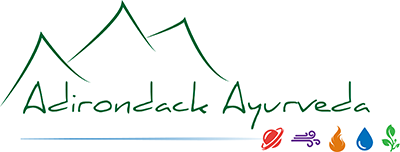It was at Kripalu, in Stockbridge, Massachusetts where Ayurveda found me. I had not heard of it, never practiced its sister science, yoga nor was I aware of my breath (other then to notice it when I was hurried and stressed and trying to catch it). As soon as I saw the word Ayurveda on a poster outside the dining hall, I was drawn to it. It was, and still is, a gentle pull, as if I am floating on a raft on a lake, and at the end of this raft is a rope, and at the end of the rope, somewhere off where I cannot see, I am being brought to a place where I want to be. It is this constant tug that led me to 650 hours of study, introduced me to wise and revered teachers and sangha, brought me to India, and had me accomplish goals I never dreamed I had. Ayurveda taught me how to go inward to know the divine in others and in myself, lead a healthy life, move with yoga, and breathe. This all began with a single question when I noticed the word, and asked, “What is Ayurveda?”
When translated literally, this Sanskrit word’s roots Ayu (life) and Veda (knowledge or wisdom) serve to name the world’s oldest system of health. The meaning in practice is to have knowledge of the constant connection of one’s mind, body, senses and soul and how their balance leads to a life of health and bliss.
Ayurveda is the 5,000 year old, sacred, natural healing science of India. Sages passed it down to mankind with the understanding that by following its physical and spiritual laws, suffering and pain would be relieved. It is based on observations of man and his interactions with the environment, on the principle that everything in the universe is made up of the 5 elements (ether, air, fire, water and earth) and that man is the microcosm of the macrocosm.
Ayurveda supports western medicine in that it offers natural methods to regain and maintain health. It empowers one to take control through proper diet, lifestyle, exercise and meditation based on their individual constitution, dosas. When we have illness or dis-ease our constitution is out of balance. We have the choice and means to bring our dosas, our life energies, back into balance so that we may reduce or avoid poor health. Ayurveda is often referred to as nature’s medicine as it teaches us how to individually achieve this balance by being mindful of what we eat, how we feel, the time of day and season, how we think and pray. Ayurveda teaches us the physical and spiritual laws that govern our well-being. It guides us with a complete, intuitive, holistic model that has stood the test of time because its principles are as old as life.
There are many aspects to this science, all of which to say the least are fascinating. Yet when you begin to learn the smallest fact, you find it is threaded to knowledge that transcends to a universal connection, a universal message of bliss and health. I look forward to sharing this message with you monthly. Till then, I wish you peace, joy and light.
